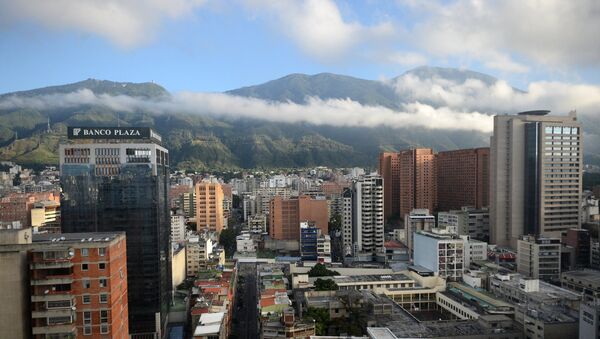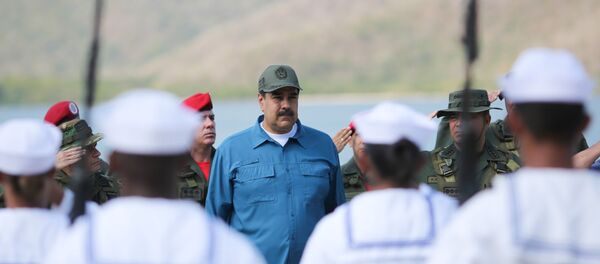Radio Sputnik spoke about the possibility of a US military intervention in Venezuela with Australian analyst Tim Anderson, a Senior Lecturer in Political Economy at the University of Sydney and author of 'The Dirty War on Syria'.
Sputnik: Now in your view, how high are the chances now of US military intervention in Venezuela? I did see a tweet, a video of military helicopters flying in the skies over Colombia in vast quantities. What is your feeling at the present moment in time?
Tim Anderson: I think it is a dangerous situation but I suspect that there is not going to be an all-out invasion. I would be very surprised there. But it's very dangerous, the way that the Trump administration has been talking.
Sputnik: Well, absolutely, I have seen a few interviews by John Bolton on the various news channels the USA, he is very robust in his intention to have the administration change in Venezuela and the tone doesn't seem to be dropping, either. If this intervention does happen, how high are the chances of it growing into a wider conflict involving several states?
READ MORE: Venezuela's Money in Guaido's Hands: The Great Loser Will Be the People
Tim Anderson: Well, Venezuela is a big country in itself; there will be terrible consequences if there's an invasion from Columbia. It's true [that] there are 7 US bases in Columbia, and it has always been a threat to the surrounding countries, in particular, Venezuela. But before we talk about the wider escalation, the idea of a war in Venezuela, with almost 30 million people, and a very strong army that's now quite behind the government, is a terrible prospect.
Sputnik: Well, absolutely, and obviously it is interesting to sort of hear, and we have been reporting on the news this morning that Italy is against any intervention from the US in terms of promoting Guaidó as the new proposed president. So, there is a lot of indifference to this. I was listening to a UK MP politician who is vociferous in his condemnation as well. So, within the European Union, even though it is their stance, there is a lot of indifference to this. Why? I mean, perhaps you can just explain, and expand to our global listeners, why the US is so interested in Venezuela? Why is it so important? Now, obviously, we know about the oil exports, the volume of oil that's utilised from Venezuelan territory, but is it just oil?
Tim Anderson: No, it's more than just oil. Of course, the oil reserves are massive, there are something like 300 billion barrels of proven oil reserves, which is the largest in the world.
There have been many boycotts of elections by the opposition. So, there have been different forms of subversion and aggression and sanctions and so on. So, really the question is what the US is really going to do about it. It is quite extraordinary, isn't it, because after all they have tried the same thing with Syria; they would like to do it with Iran. But having failed against Syria, being involved in a quagmire in Afghanistan and in Iraq, one wonders, doesn't one, what really do they think they are going to achieve in a situation there. They are, of course, taking economic measures.
They have seized billions of dollars of assets of Citgo, which is Venezuela's biggest industrial concern, and they claim they are handing over some of that to their selected puppet leader, Juan Guaidó. But what they are going to do militarily is a puzzle really.
They're very overextended. Their military adventures haven't been very promising in the Middle East. Of course, some people say that they ignored Venezuela when they were pursuing all these various wars that are still ongoing in the Middle East, but I am puzzled really as to what they realistically expected [that] they can achieve.
Sputnik: It is very interesting, isn't it, when you have just highlighted the fact that obviously, the US is been into Iraq and Libya; it's had, as you have said, an age-old problem with Afghanistan. The global audience now is rather indifferent to this interaction by the US government and militarily. And it's a difficult one for the US government, even if there is an administration in Venezuela that is rather…well, in terms of pressure and controlling the whole resources within the country to the government's end, the US would be better off just having a waiting game, wouldn't they, and squeezing the government out of the way, would that be the best strategy?
Tim Anderson: Well, the opposition has had quite a strong presence in the state since at least 2015 when they got control of the National Assembly. That has to some extent has been outflanked by the Constituent Assembly now and President Maduro is now threatening early National Assembly elections rather than early presidential elections.
There are big social programmes subsidised by the oil money. So, that's been called a privatization bonanza for US corporations, and I believe John Bolton has spoken openly about the oil. But there are these other assets in the country that US corporations would like to get their hands on.
The question is what they are going to do about it. Now, there is no doubt that the US can inflict pain and damage on Venezuelan people, on the Venezuelan economy. But really, you know, what are they going to gain? That is not so clear.
Sputnik: To me you are obviously very experienced in terms of your being an analyst and senior lecturer. You have written your book on Syria. From your point of view and your experience, what would you like to be seen to be done in this [situation]? What could you advise and recommend? It is obviously a very delicate situation as I alluded to in my last question. What is the best way forward you think?
Tim Anderson: Well, on the one hand, the government in Venezuela, which is quite legal, the state institutions are fully behind it, are saying they are not going to negotiate sovereignty. They are going to defend their sovereignty. But on the other hand, there are some of the independent states in Latin America that still exist, including particularly Mexico and Uruguay, which have got talks to try and create some sort of dialogue to mediate the potential violence.
I mean the great danger of what the US is doing and its European partners, which see to be unthinkably following it, is to ferment more internal violence in the country. That seems to be what they want.
The views and opinions expressed by the speaker do not necessarily reflect those of Sputnik.



